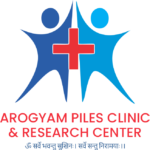Piles, also known as hemorrhoids, are swollen veins in the rectal and anal area that cause discomfort, itching, and bleeding. While modern medicine offers surgical and invasive treatments, many people are turning to Ayurveda for natural, non-invasive remedies. Ayurveda, with its deep roots in holistic healing, provides effective solutions through natural herbs, dietary changes, and lifestyle modifications.
In this comprehensive guide, we’ll explore the best Ayurvedic medicine for piles, including dietary recommendations such as anal fissure food, lifestyle tips, and why Arogyam Ayurveda Mohali is a trusted center for piles treatment. With Ayurveda, you can address the root cause of piles and find lasting relief without the need for surgery.
What Causes Piles?
Piles occur due to increased pressure in the lower rectum. Contributing factors include:
- Chronic constipation
- Straining during bowel movements
- Prolonged sitting
- Pregnancy
- A low-fiber diet
Ayurvedic medicine aims to address these root causes through natural treatments that reduce inflammation, heal the tissues, and promote regular bowel movements.
Best Ayurvedic Medicine for Piles
Ayurvedic remedies for piles focus on balancing the body’s doshas (Vata, Pitta, and Kapha) and promoting digestive health. Below are some of the best Ayurvedic medicines and herbs that can help manage piles effectively:
1. Triphala Churna
Triphala, a blend of three potent fruits (Haritaki, Bibhitaki, and Amalaki), is one of the most widely recommended Ayurvedic medicines for digestive health. Triphala helps regulate bowel movements, preventing constipation, which is a major cause of piles. It also detoxifies the colon and reduces inflammation.
Dosage: Take 1 teaspoon of Triphala powder mixed with warm water before bed to ensure smooth bowel movements.
2. Kanchnaar Guggul
Kanchnaar Guggul is another popular Ayurvedic medicine used to treat piles. This herbal blend is known for its anti-inflammatory properties and is especially effective for reducing swelling in external piles. It also helps in the detoxification of the lymphatic system.
Dosage: Typically taken as 1–2 tablets, twice daily, with warm water after meals.
3. Pippali
Pippali (long pepper) is a powerful herb in Ayurveda that helps in strengthening digestion and improving metabolism. It also helps to clear blockages in the digestive tract, promoting better circulation in the rectal area, thus aiding in the reduction of piles.
Dosage: Pippali can be taken in powdered form or as part of Ayurvedic formulations prescribed by a practitioner.
4. Arshkuthar Rasa
This Ayurvedic preparation is specifically designed for treating piles. It helps in reducing bleeding, swelling, and inflammation in the affected areas. Arshkuthar Rasa is particularly useful for treating both bleeding and non-bleeding piles.
Dosage: Typically, 1–2 tablets are taken twice a day with buttermilk or warm water.
5. Abhayarishta
Abhayarishta is an Ayurvedic tonic known for its laxative properties. It helps relieve chronic constipation, a major cause of piles, by promoting regular and soft bowel movements. This herbal tonic also helps reduce inflammation and bleeding associated with piles.
Dosage: 15–30 ml of Abhayarishta, diluted with water, can be taken after meals twice a day.
Ayurvedic Diet for Piles: What to Eat and Avoid
A critical part of managing piles through Ayurveda involves making dietary changes that support digestion and prevent constipation. The right diet can also help heal fissures, which often accompany piles. Here are some dietary recommendations:
Best Foods for Piles and Anal Fissures
- High-Fiber Foods: Fiber is essential for preventing constipation and reducing strain during bowel movements. Include plenty of fruits, vegetables, whole grains, and legumes in your diet. Examples include:
- Apples, pears, and prunes
- Leafy greens like spinach and kale
- Lentils, chickpeas, and beans
- Oats, brown rice, and whole wheat
- Hydration: Drinking plenty of water is crucial for keeping stools soft and easy to pass. Aim for at least 8–10 glasses of water a day. You can also include coconut water, herbal teas, and buttermilk.
- Buttermilk: A traditional Ayurvedic remedy, buttermilk aids digestion and cools the body, reducing Pitta dosha, which is often imbalanced in piles. It also helps in promoting a healthy gut environment.
- Ghee: Pure cow’s ghee is recommended in Ayurveda for its lubricating properties. It helps soften stools and supports digestion, making it easier for patients with piles and fissures.
Foods to Avoid for Piles and Fissures
Avoiding certain foods is just as important as consuming the right ones. Here are foods that should be limited or avoided to prevent worsening piles symptoms:
- Spicy Foods: Excessively spicy foods can aggravate Pitta dosha, leading to inflammation in the anal area.
- Fried and Oily Foods: These foods slow down digestion and can lead to constipation, which worsens piles and fissures.
- Processed Foods: Foods high in preservatives, sugars, and unhealthy fats are difficult to digest and can cause constipation.
- Caffeine and Alcohol: Both dehydrate the body and can contribute to constipation and irritation.
Ayurvedic Lifestyle Recommendations for Piles
Ayurveda emphasizes not just medicine and diet but also lifestyle changes that support healing. Below are some Ayurvedic lifestyle tips to manage piles effectively:
- Exercise Regularly:
- Moderate physical activities like walking, yoga, and swimming help improve digestion and prevent constipation. Certain yoga poses, such as Malasana (Squat Pose) and Pawanmuktasana (Wind-Relieving Pose), are particularly helpful for reducing piles symptoms.
- Avoid Prolonged Sitting:
- Sitting for long periods can increase pressure on the anal veins. If your job requires sitting for extended hours, take breaks to walk and stretch.
- Practice Proper Bowel Habits:
- Avoid straining during bowel movements. If you feel constipated, don’t force a bowel movement as this can worsen piles. Instead, use natural laxatives like Triphala to soften stools.
- Use Warm Sitz Baths:
- A warm sitz bath (sitting in a shallow tub of warm water) for 15–20 minutes can relieve irritation, pain, and itching in the anal region.
- Consult a Professional:
- For personalized treatment and guidance, it’s always best to consult an Ayurvedic doctor. If you’re in the Mohali region, Arogyam Ayurveda Mohali offers specialized treatments for piles and related digestive disorders.
Arogyam Ayurveda Mohali: Holistic Piles Treatment Center
When it comes to managing piles and fissures, Arogyam Ayurveda Mohali is a trusted name. The clinic specializes in treating piles, fissures, and other digestive disorders using traditional Ayurvedic practices. The treatment approach focuses on addressing the root cause of the condition, balancing the body’s doshas, and promoting overall health.
Why Choose Arogyam Ayurveda Mohali?
- Expert Practitioners: The clinic has experienced Ayurvedic doctors who provide personalized treatment plans.
- Natural Remedies: The focus is on herbal medicines, dietary changes, and lifestyle modifications rather than invasive procedures.
- Comprehensive Care: The clinic offers treatment for a wide range of digestive issues, including piles, fissures, and fistulas.
Conclusion
Ayurveda offers a natural, holistic approach to treating piles, focusing on dietary changes, lifestyle adjustments, and herbal remedies. By incorporating the best Ayurvedic medicine for piles and following the recommended diet and lifestyle tips, you can effectively manage piles and prevent future flare-ups.
If you’re looking for personalized care and effective treatment, consider visiting Arogyam Ayurveda Mohali. With the right guidance, you can find relief from piles and restore your digestive health naturally. Remember, consistency in your diet and lifestyle choices is key to long-term healing.



